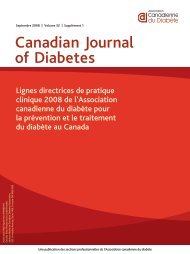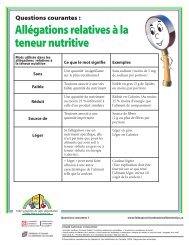2008 Clinical Practice Guidelines - Canadian Diabetes Association
2008 Clinical Practice Guidelines - Canadian Diabetes Association
2008 Clinical Practice Guidelines - Canadian Diabetes Association
You also want an ePaper? Increase the reach of your titles
YUMPU automatically turns print PDFs into web optimized ePapers that Google loves.
SCREENING<br />
All individuals with diabetes and their families should be regularly<br />
screened for symptoms of psychological and social distress<br />
(2,20). Healthcare professionals should actively explore<br />
psychological factors by asking empathetic but frank openended<br />
questions about stress, social support, unhealthy selfcare<br />
behaviours, health beliefs about risk of complications,<br />
treatment efficacy and the degree of interference with normal<br />
functioning (37). People with diabetes should be<br />
screened for depression and anxiety regularly, either through<br />
direct queries (e.g. “During the past month, have you often<br />
been bothered by feeling down, depressed, or hopeless?” and<br />
“During the past month, have you often been bothered by little<br />
interest or pleasure in doing things?”) (38), or with a standardized<br />
questionnaire (e.g. Beck Depression Inventory [39],<br />
the Problem Areas in <strong>Diabetes</strong> scale [37], the Child Health<br />
Questionnaire [CHQ] [40], Behaviour Assessment System for<br />
Children [BASC] [40]).<br />
INTERVENTIONS<br />
Preventive psychological interventions should be incorporated<br />
into all primary care and self-management education<br />
interventions to enhance adaptation to diabetes and reduce<br />
stress. Educational and psychological interventions often<br />
share a theoretical basis around increasing readiness to<br />
change and self-efficacy (41,42).<br />
Effective interventions for children and adults include<br />
psychosocial support, feedback and reinforcement (20,43-<br />
45); coping skills training (46); cognitive-behavioural therapy<br />
(CBT) (47); and family behaviour therapy (48).<br />
Approaches that increase patient participation in decisionmaking<br />
regarding care and education have been shown to be<br />
more effective than a “do as I say” approach in enhancing<br />
psychological adjustment to diabetes, and potentially preventing<br />
psychological distress (49-51).<br />
For those with suboptimal self-care or significant psychological<br />
symptoms, focused interventions using CBT or<br />
family behaviour therapy need to be considered (43,52).<br />
These issues should be addressed using psychosocial services<br />
within diabetes teams or resources in the community. In<br />
pediatric populations, intensive case management with psychoeducation<br />
may be required (43,52). In-home, multisystemic<br />
therapy can be used to reduce diabetes-related stress<br />
(53), improve glycemic control and reduce inpatient admissions<br />
for adolescents with poor glycemic control (2,54).<br />
Antidepressant medication (55) and CBT have each been<br />
shown to be specifically effective in treating depression in<br />
adults with diabetes (56). Risk of significant weight gain<br />
during extended use of selective serotonin reuptake<br />
inhibitor antidepressants may be greater for paroxetine<br />
(57); sertraline or fluoxetine may be preferred in this<br />
weight-sensitive population.<br />
RECOMMENDATIONS<br />
1. Individuals with diabetes should be regularly screened<br />
for subclinical psychological distress and psychiatric disorders<br />
(e.g. depressive and anxiety disorders) by interview<br />
[Grade D, Consensus] or with a standardized<br />
questionnaire [Grade B, Level 2 (39)].<br />
2. Patients diagnosed with depression, anxiety or eating<br />
disorders should be referred to mental health professionals<br />
who are either part of the diabetes team or are<br />
in the community [Grade D, Consensus].Those diagnosed<br />
with depression should be offered treatment with CBT<br />
[Grade B, Level 2 (56)] and/or antidepressant medication<br />
[Grade A, Level 1A (55)].<br />
3. Multidisciplinary team members with required expertise<br />
should offer CBT-based techniques, such as stress management<br />
strategies and coping skills training [Grade A, Level<br />
1A for type 2 diabetes (42); Grade B, Level 2, for type 1 diabetes<br />
(46)], family behaviour therapy [Grade B, Level 2<br />
(48,53)] and case management [Grade B, Level 2 (43,53)]<br />
to improve glycemic control and/or psychological outcomes<br />
in individuals with suboptimal self-care behaviours,<br />
suboptimal glycemic control and/or psychological distress.<br />
OTHER RELEVANT GUIDELINES<br />
Organization of <strong>Diabetes</strong> Care, p. S20<br />
Self-management Education, p.S25<br />
Type 1 <strong>Diabetes</strong> in Children and Adolescents, p. S150<br />
Type 2 <strong>Diabetes</strong> in Children and Adolescents, p. S162<br />
REFERENCES<br />
1. Delamater AM, Jacobson AM, Anderson B, et al. Psychosocial<br />
therapies in diabetes. Report of the Psychosocial Therapies<br />
Working Group. <strong>Diabetes</strong> Care. 2001;24:1286-1292.<br />
2. Wysocki T, Buckloh LM, Lochrie AS, et al. The psychologic<br />
context of pediatric diabetes. Pediatr Clinic North Am. 2005;52:<br />
1755-1778.<br />
3. Kovacs M, Goldston D, Obrosky DS, et al. Psychiatric disorders<br />
in youths with IDDM: rates and risk factors. <strong>Diabetes</strong> Care.<br />
1997;20:36-44.<br />
4. Landolt MA,Vollrath, Laimbacher J, et al. Prospective study of<br />
posttraumatic stress disorder in parents of children with newly<br />
diagnosed type 1 diabetes. J Am Acad Child Adolesc Psychiatry<br />
2005;44:682-689.<br />
5. Grey M, Cameron ME, Lipman TH, et al. Psychosocial status<br />
of children with diabetes in the first 2 years after diagnosis.<br />
<strong>Diabetes</strong> Care. 1995;18:1330-1336.<br />
6. Jacobson AM, Hauser ST, Lavori P, et al. Family environment<br />
and glycemic control: a four-year prospective study of children<br />
and adolescents with insulin-dependent diabetes mellitus.<br />
Psychosom Med. 1994;56:401-409.<br />
7. Lloyd CE, Dyer PH, Lancashire RJ, et al. <strong>Association</strong> between<br />
stress and glycemic control in adults with type 1 (insulindependent)<br />
diabetes. <strong>Diabetes</strong> Care. 1999;22:1278-1283.<br />
8. Seiffge-Krenke I, Stemmler M. Coping with everyday stress<br />
S83<br />
MANAGEMENT











